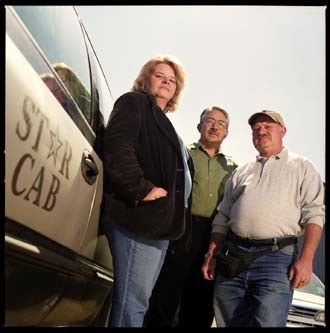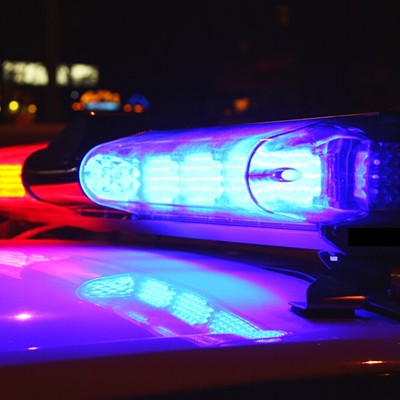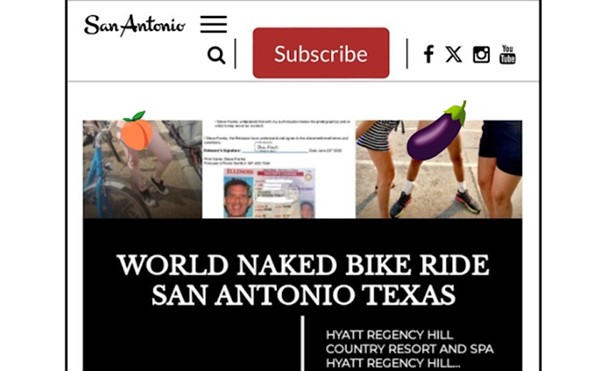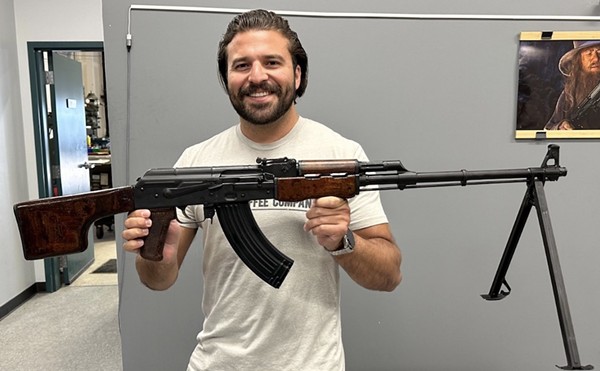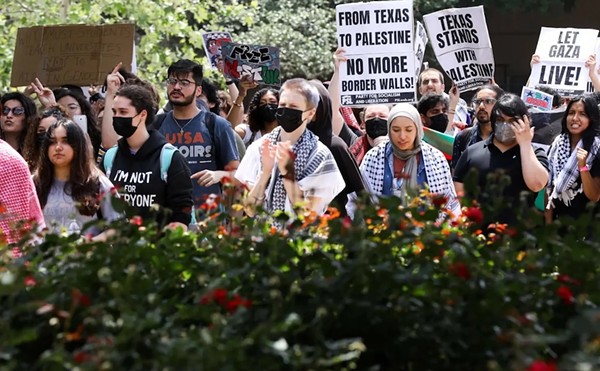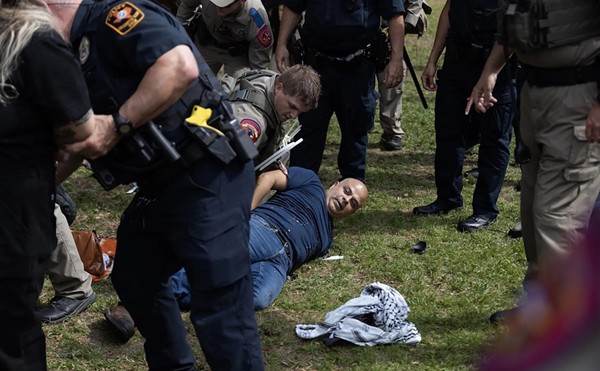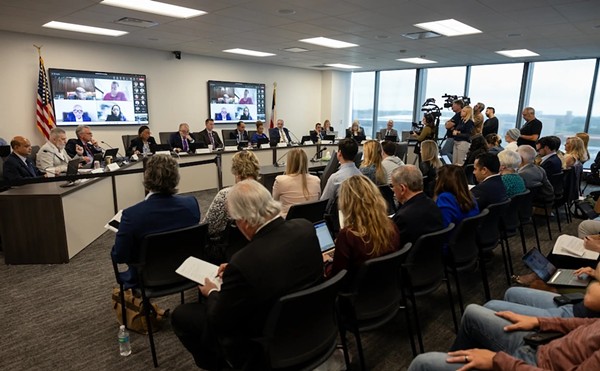Cabbies fight City, taxi company in court
| Cabbies Debra Traphagan, Alfredo Flores, and Sam Lajzerowicz stand next to Traphagan's former Star Cab. (Photos by Mark Greenberg) |
Cab driving is a game of averages, a bet that the driver only occasionally wins. One day you're in the hole for $40, the next, you're up $100 at the end of an arduous 12-hour shift on San Antonio's beat-up streets.
With more than 50 years' of driving among them, longtime cabbies Alfredo Flores, Sam Lajzerowicz, and Debra Traphagan thought they had seen it all. That is until, they rammed up against the City and their former employer, Star Cab.
The three drivers are suing the City and Star Cab, alleging that the City's Ground Transportation Unit wrongly stripped them of their taxi permits, and that the cab company illegally charged them monthly dues - money that seems to have evaporated without being accounted for - and retaliated against the drivers who complained.
"We didn't agree to get robbed," says Lajzerowicz. "We're asking the court to take over Star Cab and resolve this."
The saga begins in 1992, when City Council voted to allow independent cab cooperatives to organize and apply for taxi permits with the San Antonio Police Department's Ground Transportation Unit. The cooperatives differ from privately owned firms in that drivers own their vehicles, and pay monthly membership dues and fees for a radio dispatch service. Drivers with privately owned firms often have to pay high daily lease fees for their cars.
Two years later, seven cab drivers who thought they could earn more money in a co-op applied for a business loan, purchased several taxis, and created Star Cab Cooperative Association Inc. The drivers paid $100 for the permit applications, and $150 for founding Star Cab Co-op member Cruz Chavira to submit the applications.
In 1974, Alfredo Flores relocated from México City to San Antonio and leased a taxi from a local company and began driving. After about a year, he bought his own car, eliminating the high cost of a daily lease.
Leasing a cab can cut into a driver's profits. Yellow-Checker reportedly leases a cab at $79 per day, or $400 for a five-day work week. In contrast, in 2003 Star Cab Cooperative's monthly membership dues were $325, including insurance and an $80 dispatch fee.
Flores was a founding member of the co-op who believed that he would be a part-owner of the non-profit corporation. The new co-op recruited taxicab owners/operators, including Lajzerowicz, who at the time worked for Yellow-Checker. For Lajzerowicz, an offer to join an independent taxi cooperative appeared to be a good career choice. He already owned his cab, his driving record was clean, and he could earn more money. After submitting the required paperwork, Lajzerowicz interviewed with the City, which issued him a taxi permit. He thought the permit belonged to him, not to the co-op.
"I got into driving a taxi because my dad had Alzheimer's, and I needed to work flexible hours," explains Lajzerowicz, who was born in Russia. "I didn't want to put him into a nursing home, and I needed to come and go as I pleased."
Initially, the co-op seemed like a good deal. But trouble started in August 2001, after officers on Star Cab's board of directors allegedly borrowed $10,000 from its co-op members, including Flores, Lajzerowicz, and Traphagan, and incorporated All Taxi Dispatch Services Inc. All Taxi was established as a for-profit company owned by members of the non-profit Star Cab Cooperative, according to legal documents.
| |
The rub was that 26 original co-op members never received any ownership papers. In addition, they allegedly were told by Star Cab President Paul Foutz they had to either work more hours or pay an additional $200 per month to pay for the All Taxi Dispatch Services that now shared offices with Star Cab.
However, independent drivers who used All Taxi Dispatch weren't required to pay the extra $200 per month, only co-op members. Flores, Lajzerowicz, Traphagan and four other Star Cab driver/owners protested what they considered "extortion," and applied to the City to transfer their permits to another cab company.
Moreover, several co-op members presented to the Star Cab board of directors a letter dated May 2002, which included several questions about the incorporation of All Taxi: expenses and revenues for Star Cab and All Taxi, a list of recipients of the extra monthly payments, the name of the person writing and signing checks. And since the cab drivers were reportedly shareholders and partial owners in All Taxi, they also wanted to see paperwork to prove it.
These inquiries infuriated the board. Mary Calk, a Star Cab board officer heard about the requested transfer, and according to the minutes of a September 22, 2003 meeting of the City's Transportation Advisory Board, stated that "the eight members would be voted out of the co-op at the next co-op meeting."
Calk and other members of All Taxi Dispatch and Star Cab didn't return repeated telephone calls from the Current.
As Calk predicted, Star Cab Cooperative officers held a meeting, which was attended by 16 of Star Cab's members, who voted to oust the rabble-rousing drivers. Star Cab's Foutz sent a letter dated October 2003, informing the cab drivers, including Flores, Lajzerowicz, and Traphagan that their membership had been terminated "for your attempt to withdraw ... taxi permits from Star Cab."
While the cab drivers assumed they owned their taxi permits, the City - and later, a judge - determined that Star Cab owned them. Star Cab went further, canceling the cab drivers' insurance, prompting the City to revoke their permits, even though the drivers were current on their insurance payments. Star Cab then arranged to have the permits transferred to other drivers in the cooperative.
The City insists it is not involved in the ousting of the drivers. "The co-op voted them out," says Anna Deosdade, manager of the Ground Transportation Unit responsible for issuing the City's 726 taxicab permits. "The drivers wouldn't own the permits, unless the permits were under a co-op, or they had a company of their own."
For example Mike Barnard of Yellow-Checker Cab has a fleet of more than 400 taxis, which qualifies him as a cab company owner. Individual taxi drivers cannot own companies. It takes at least six drivers to apply to form a cooperative. In the case of Star Cab, seven drivers applied for the permits, which turned out to be owned by the co-op.
In the lawsuit, the cabbies allege that Calk, Foutz, former Star Cab President Tom Johnson, and founding member Cruz Chavira, "spearheaded the effort to illegally force a vote" to expel the drivers from Star Cab in retaliation for their objections to the mandatory fees to All Taxi. The suit also alleges the drivers were tossed because they tried to transfer their permits to another company.
Flores, Lajzerowicz, and Trephagan sought an injunction to keep their jobs and taxi permits until the case could be resolved in court. Instead, they had to endure a long process to use permits held by other taxi companies, and were required to pay a higher dispatch fee to continue driving taxicabs in San Antonio.
In a deposition taken on November 4, 2004, Chavira testified that "the City did not select Sam Lajzerowicz for a taxi permit; it was the membership to Star Cab."
Chavira also testified that All Taxi is a "work in progress," which could explain why the members' questions were not answered. "We went to some corporate whiz that's supposed to advise on the best structure for the type of corporation, and so on and so forth. We gave him that input and we haven't had a chance to go back and sit down, because of all the divisions that have occurred since then, the lawsuits ... "
Chavira also testified that he didn't believe the plaintiffs were kicked out of the Star Cab cooperative. When plaintiffs' attorney Morris Kirschberg pressed Chavira for more answers, he said, "The turmoil was enormous ... the turmoil that Sam was creating ... we couldn't progress in any other direction because we had to deal with the same questions, vote again to demonstrate to them that a clear majority did not favor their position."
In 1988, Debra Traphagan moved from Illinois to San Antonio, where she took a job at Kelly Air Force Base. She lost her job when Kelly downsized. After signing with Yellow-Checker Cab, she was approached by officers in the Star Cab cooperative who urged her to apply for a taxicab permit. Traphagan says Star Cab's President Tom Johnson made her several promises: that she would own her permit if she owned her cab and signed with the co-op, and that she would earn more money as an independent taxi driver who owned a piece of the company.
Traphagan says Star Cab's board members told her she would pay $300 in monthly dues, including insurance and radio dispatch service if she joined Star Cab.
Traphagan, who now operates her own taxi on a permit held by Yellow-Checker, says she pays $275 per week to drive for that company. She works the maximum 12-hour shifts authorized by the City, and after paying the lease for the permit and dispatch service, a daily meal, and other expenses, "I'm lucky to have $250 at the end of the week.
"The financial stress has been very hard on me," says Traphagan, who lost her house as a result.
The original lawsuit included seven drivers, but the first attorney hired to file the case negotiated with Star Cab to return four drivers to work. The company allegedly refused to negotiate with Flores, Lajzerowicz, and Traphagan, who are still suing Star Cab and the City.
Although District Judge Michael Peden ruled that Star Cab owned the cab permits, he didn't rule on the argument that Star Cab demanded money from its members to pay for the operations of All Taxi, a for-profit corporation. He also didn't rule on whether Star Cab should provide documents to show the drivers are part owners of Star Cab and All Taxi Dispatch.
Flores, Lajzerowicz, and Traphagan are pursuing another lawsuit, alleging that they have been "subject to an improper and illegal expulsion from Star Cab" and that "the actions of the directors or those in control of Star Cab have been illegal, oppressive and fraudulent."
| "Nobody knows anything about this, and I believe that members of Star Cab will be shocked when they see this." — Sam Lajzerowicz |
An April 1 hearing concerns the drivers' request to put Star Cab into receivership to account for the money that flows between Star Cab's membership and All Taxi. Copies of a 2002 income tax return that was filed by All Taxi Dispatch Services shows that it reported a gross profit of $82,907, with $24,945 paid out in wages and salaries. Lajzerowicz says that wage amount is what the drivers were ordered to pay to All Taxi to keep it afloat.
The 2002 IRS form lists "other deductions" including $31,934 that was allegedly paid in "commissions."
Lajzerowicz says he did not know about anybody working for a commission at All Taxi. He also says he didn't know anything about paying commissions. "I never saw any annual report, no proof of ownership, and I never received any commission check," says Lajzerowicz. "I never saw any commission salespeople. Nobody knows anything about this, and I believe that members of Star Cab will be shocked when they see this.
"Is this Cuba or the United States? We hope there will be real justice here." •
By Michael Cary

